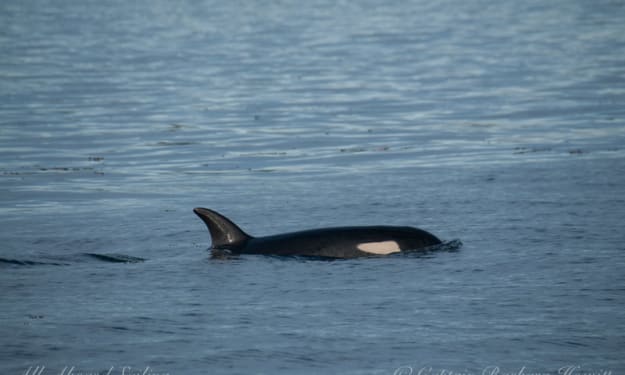Obituary: J50, Also Known as Scarlet
The death of a four-year-old orca from the Southern Resident killer whale population shows the world of what could happen when people don’t take action to save the life of a sick animal.

J50, also known as Scarlet, is now believed to have died from an illness relating to malnutrition after researchers off the coast of Washington state were unable to find her among a super pod gathering of all the whales from the Southern Resident community on Thursday. All search efforts to find the animal by boat, plane, and from shore came up with no sight of the four-year-old orca. She was last sighted on September 7th, but the search still continues.
Born during a 2014 baby boom to J16, who is also known as Slick, Scarlet is thought to have been delivered with the help of two different pod members who served as "midwives" during her birth. Evidence for this could be found on the scarred areas of her body, which has led researchers to believe that Slick was experiencing a complicated birth when two members of J-Pod pulled her out. At around seven months old, Scarlet became an internet sensation when she was sighted performing 60 different breaching related behaviors in front of several whale watch boats as her family entered the Salish Sea. The number of photos and videos that exist of her performing these surface behaviors helped make her one of the most recognizable wild orcas in the world.
In recent months, Scarlet was seen looking completely emaciated, which lead researchers to believe that she would not be able to survive unless she ate a certain amount of Chinook salmon. This food source would provide her the nutrition that she would need to continue to thrive. Because Scarlet was a female, she represented what should have been a positive future for the Southern Resident orca population since every female whale born into this endangered orca population has the potential to one-day breed and contribute calves to the population. However, in the last few years, the Southern Resident orca community has experienced a high rate of failed pregnancies as a result of the lack of their major food source, the Chinook Salmon.
Around the same time, as Scarlet was fighting for her life, researchers were making their own efforts to save her. They first made such attempts by dating her with medication from a distance as a way to treat a possible infection. Meanwhile feeding her live salmon with assistance from members of a First Nation tribe. However, when it was proven that these efforts failed, the government announced its own plan to make an attempt to rescue her by taking her into a sea pen in hopes to rehabilitate her with all intention to one day release her back to her pod when she made a full recovery. This was not met without the unpleasant ignorance of the animal rights movement, who believe that she was "better off dead" than be saved and have a chance at one day contributing to a dying orca population. These people opposed any rescue attempt that would require Scarlet to be rehabilitated. They claimed it would remind the world of the orca captures that took place in Washington waters during the 60s and 70s, since it would involve having Scarlet be away from her family pod. Yet, some of her last known sightings saw the young mammal struggling to keep up with her pod. As for any rescue attempt, the researchers stated that a rescue would only be attempted if she either stranded or was unable to keep up with her pod. Now that Scarlet might now be long gone, any chance of a rescue attempt may be out of reach. Meanwhile, suggesting that the government was not doing enough to save Scarlet when they were being dictated by animal rights extremists into enabling nature to "take its course" is just nothing more than simply, poor commentary towards this complicated conservation issue. For me, personally, I wish they got to her sooner so, that she would have a better chance at life.
The possible death of Scarlet now leaves the Southern Resident orca population to about 74 animals and efforts must now be focused on trying to save what is left of the endangered Chinook salmon population. Scientists believe that it's possible for salmon populations on the West Coast to recover if the United States government approves the dam-breaching of the Lower Snake River Dams. These dams are known to kill millions of migrating salmon each year and has now lead to the Chinook salmon to face extinction. The dams are also believed to be responsible for the population decline among the Southern Residents in the first place. In Canada alone, the Chinook salmon population that once ran through the Fraser River, have all been decimated through habitat loss, overfishing, and pollution.
I can only hope that the message that was brought about by J50, J35, and her calf will remind the world about the plight that Southern Resident orcas are facing out in the wild. This population continues to lose reproductive capacity and extinction is only beginning to loom on the horizon. So far, every effort that has been to save this population has resulted in nothing and if this keeps up, we could end up losing these orcas for good. So, let's stop talking wild orcas to their deaths and put more focus on protecting them, the salmon they rely on, and their ever-shrinking habitats from dying out anytime soon. For Scarlet's sake.
About the Creator
Jenna Deedy
Zoo and Aquarium Professional, Educator, Cosplayer, Writer and B.A. in Psychology whose got a lot to share when it comes to animals, zoos, aquariums, conservation, and more.
Instagram: @jennacostadeedy






Comments
There are no comments for this story
Be the first to respond and start the conversation.